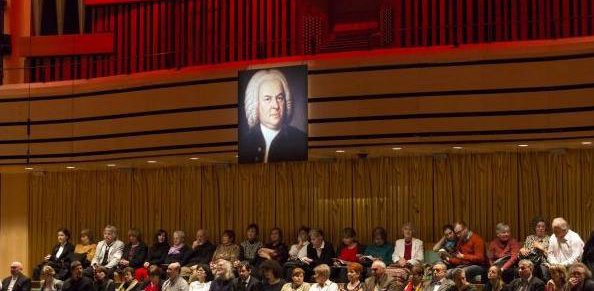Yet I could not help regretting that I missed the Pannon Philharmonic Orchestra’s performance of the piano concertos (BWV 1056, 1060, 1064). Or rather part of it, because I stood by the Bartók Radio’s broadcasting unit at the Palace of Arts, where I could hear from the speakers what was happening in the grand hall in quite good quality. Three piano concertos written in C major were performed with Zoltán Fejérvári, András Kemenes and János Palojtay sitting at the piano; the conductor was András Vass. Wonderful tempos, brilliant sound, profound play and a cheerful finale.
Yet I missed this cheerful mood from the Magnificat on the whole. Irrespective of the piece’s religious background, Mary greets Elizabeth with “Magnificat anima mea Dominum” (My soul doth magnify the Lord), which is one of the most beautiful musical demonstrations of “joie de vivre”. Iván Fischer and the BFO laid great emphasis on the traditional performance, which nevertheless made the concert less spontaneous. Besides using “period instruments”, Fischer made even more historical gestures: the Magnificat, first performed in a Christmas vespers in 1723, was placed back into the original liturgic context. The two a cappella choirs, framing the composition, conveyed an impression of this particular atmosphere.
Or maybe they just served to split the piece from the Double Violin Concerto in D minor. When it comes to Iván Fischer and his orchestra, we know that we can expect a very deep and mature performance. This may have been the first time I felt that something was missing. During the double concerto, the performance of the two soloists, Johannes Pramsohler and Marlene Ito, was just not convincing enough. I really missed the lamenting melancholy of lilting sicilianos from the Largo movement, which evokes Handel’s aria “Ombra mai fu” even in the least convincing performances, and unfortunately it also lacked the dramatic climax. The final movement’s tempo was not stormy enough, and the two solo violins eventually could not maintain their harmony.
Although everything was in its place during the Magnificat, the performance still fell apart. The opening chorus movement was sluggish. The soloists’ performance was basically fine, though Dominique Labelle’s soprano voice may have been a bit too strong for the “Et exultavit”, which is a soft and playfully cheerful ode to joy, yet the opera-like passion was suited to the “Quia respexit”. The “Omnes generationes”, a sharp division between the arias, started slowly and ineffectively, just like an engine that has not been turned on for a while. Yet the Saint Ephraim Choir is very good; it was not the quality of their singing that was problematic, but their headcount, which was insufficient. The chorus lacked weight and strength. Peter Harvey, struggling with the deep sounds, sang “Quia fecit mihi magna” in a colourless manner in vain (“For the Mighty One has done great things for me”). No, he has not done great things for him.
Nevertheless, “Et misericordia”, a duet for alto and tenor, performed by the lanky Kai Wessel (countertenor) and Zoltán Megyesi elevated the audience to ethereal heights. The aurora of muted strings and two baroque flutes illuminated the hall for a few minutes. The only problem was that Megyesi’s singing was somewhat drowned out by the countertenor’s strong voice, and by the violin section during “Deposuit potentes”. Pity, because he has a clean and fine voice.
Countertenor Kai Wessel stood out from fellow soloists not only because of his extreme height and ponytail, but also because he has a strong and lustrous voice. Although his voice faltered during the “Esurientes implevit” aria once (or perhaps twice), it detracted nothing from the high standard of his singing. The closing Gloria Patri lacked a rolling and rocking motion, elevation and the revelation of the soul.
Finally, Iván Fischer even got the audience singing, which was a perfect ending to the Bach Marathon. When I heard the lady in the orange cardigan singing the chorals next to me, you could have knocked me over with a feather. She ought to have been on the stage.
Photo: János Posztós / Palace of Arts

